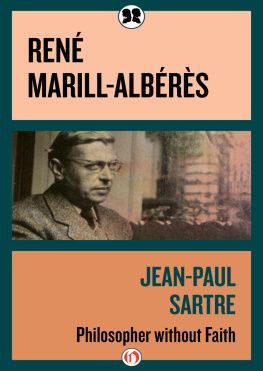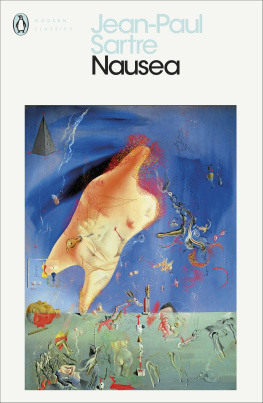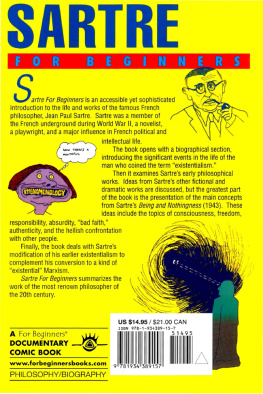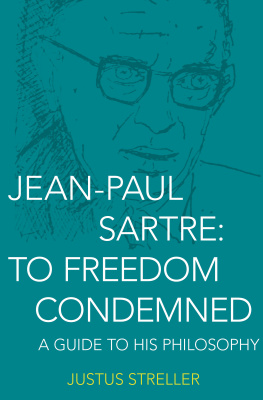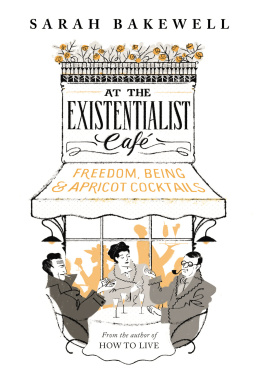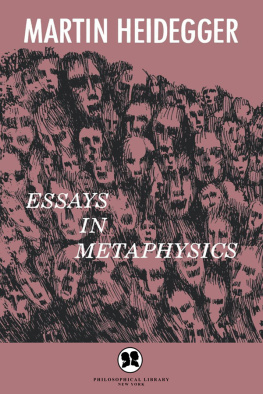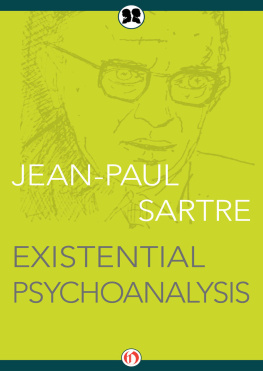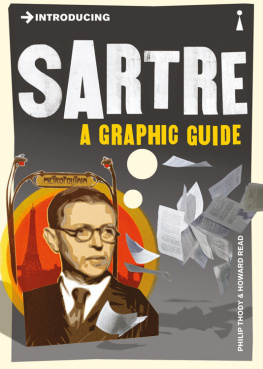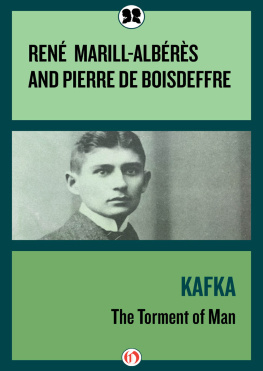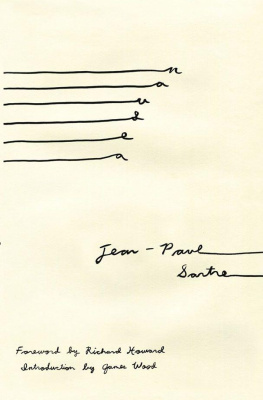Jean-Paul Sartre
Philosopher without Faith
Ren Marill-Albrs

CONTENTS
Special thanks are due to Mr. Raymond Piller, who not only compiled the list of English titles included in the appended bibliography but also made available to me a number of important works by and about Sartre. Though I have profited in many instances by consulting the English works cited, all translations of quotations from Sartres writings are my own.
W ADE B ASKIN
I. SYSTEM AND SCOPE
A. POINTS OF DEPARTURE
The painstaking analysis and logical systematization of mans solitude, freedom, and responsibility, and the desire to probe the consequences of mans independence and of his ultimate responsibility to himselfsuch are apparently the touchstones of the works which appeared between 1938 and 1946 and which made Jean-Paul Sartre a writer renowned throughout the world.
Sartres views are not new to our age. It may well be that the salient characteristic of the twentieth century is the absence of a rigorous doctrine to explain and direct human life. Horror in the face of convention and of the revelation of mans nakedness is found at the dawn of the century in Pguy as well as in Gide and Unamuno, and the human drama that Malraux and Camus subsequently lived through is also that of man confronted by his destiny.
Nor is such an attitude essentially atheistic. To Bernanos also, man is free and responsible, and alone in the dark. The idea that the paths of our lives are not marked out but depend solely on us, that everything must forever be begun anew, that there are no rules to govern our conduct and no systems to bring us stability and peace of mind, is in point of fact the hallmark of the literature of our time; and Christianity, through its most convincing and effective writers, views life not as an established order but as an adventure.
The great doctrine of Progress which caught up in its wake such men as Lamartine and Hugo has lost its appeal. The harmonious syntheses of Classicism and the great systems of the Enlightenment belong to the past.
The result is that man, cut off from the support of ready-made doctrines in which he no longer believes, is aware of his solitude. And in his loneliness his anxiety mounts as he becomes aware of his freedom and his responsibility. At the heart of the works of Bernanos, Malraux, Graham Greene, and Camus is the apparently contradictory and yet ineluctable relation of solitude to responsibility. The paradoxical relation has been labeled the tragic element, anguish, fate, and even absurdity. Man no longer believes in pat explanations and conventional, expedient rules for living, and yet the absence of external props and restraints does not eliminate his responsibility. On the contrary, recognition of his responsibility increases his anguish, with the result that the problem has finally invaded all literature and given it what is carelessly called a metaphysical aspect. This aspect is in fact moral.
The moral problem is at the heart not only of Sartres writings but also of those of his predecessors and contemporaries.
His originality, however, resides in the fact that he treats the problem systematically and philosophically. The most original characteristic of Sartres work seems at first glance to be the formulation in philosophical terms, and therefore the systematic formulation (to the extent that it is reduced to methodical postulates) of the great moral problem of the twentieth century: the anguish brought about by mans responsibility in the absence of any restraint on the exercise of his responsibility.
Man can not simply enjoy the existing world but must take a definite stand. This Sartre discovered and expressed in his most famous works, produced between 1938 and 1946, between Nausea and Roads to Freedom. It is the same necessity to act in the face of the world and the situations which it provides for us and imposes on us that Sartre has been interpreting since 1946 while changing from a psychological and moralistic writer to a political and social analyst. But this second period is also characterized by the formation of a school and by the publishing and editing of a monthly journal, Les Temps Modernes. If Sartres writings and pattern of living have taken a new tack since 1946, and if he has tended to become a cartoonist rather than a writer, the change was first imposed by his work as a moralist and by his talent as an artist.
Until 1946 Sartres writings, though designed to serve as concrete illustrations of his philosophical system, are also prime examples of his art. His novels have a life and an atmosphere of their own; they have a literary existence which at first fails even to suggest that they illustrate a doctrine. Nausea at first seems to be an account of the boredom and obsessions of an isolated, disabused celibate living in a little town he despises. Certain episodes in The Wall and in Intimacy at first seem to be obliging descriptions of obscene and frivolous beings. The first volumes of Roads to Freedom at first seem to be a sympathetic satire on weary Frenchmen who in 1938 are waiting in the Parisian bistros for the war to begin.
And certainly it is tempting to consider separately the fictional world that emerges in his early works, for it has a certain unity: trite urban scenes with nothing at the end of the avenues; ineffective but intelligent, and not wholly worthless characters without horizons and with stunted lives, always seen outside their working hours and often hard put to kill time. They are in general the human beings most frequently seen on the sidewalk or at the counter in a caf but never in a group, whether in church, in the country, in the mountains, or in a foreign land; in short, the opposite of boy scouts, and prime examples of men who might be defined according to existential psychoanalysis by their fear of being dupes. As Sartre himself puts it:
Well, my friend, she said, your lucidity always makes me laugh. You are so scared that you would give up the best deal in the world rather than risk self-deception.
Yes, of course youre right, said Mathieu. Thats what Ive been telling you all along.
Sartre has been censured for depicting such situations, and sometimes a pharisaical element has entered into the criticism. But these situations are chosen for the very reason that they epitomize the rejection of the ineluctable responsibility which is imposed on man and which Camus and Malraux bring to the fore with more restrained lyricism. Mathieu in Roads to Freedom is indeed a man who eludes his responsibility. But it is precisely by refusing to assume it that he affirms it and proves its existence. It is through a sort of reduction to the absurd that Sartre tries to focus attention on human responsibility in beings who reject it. Those who accept it prove nothing; they only affirm their belief in their destiny. Sartre pretends to prove the existence of human responsibility by pointing up its absence or its suppression among those who slight it. That he may show partiality and undue concern in depicting inaction is something else, and this brings up the eternal problem of the writer who in depicting Evil and lust so as to make them abhorrent may be a victim of his own game. This criticism has actually been directed against both Racine and Mauriac.
Mans moral solitude, which brings into focus his inevitable responsibility, is not the sole concern of other writers who have examined and protested mans fate. In Camus there is a sort of cosmic, Mediterranean brotherhood which reasserts the mating of man and the world; in Malraux, a dialog with eternity; and in Bernanos, of course, an almost carnal union between God and Satan. Still, for these three writers the central problem is the same as for Sartre, mans responsibility in the face of his destiny.

